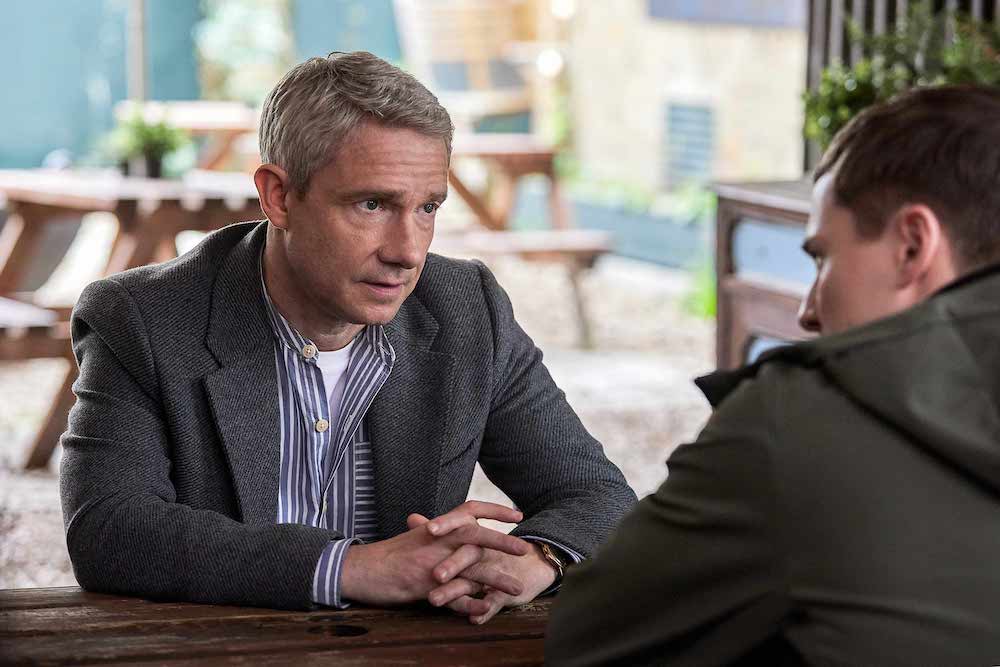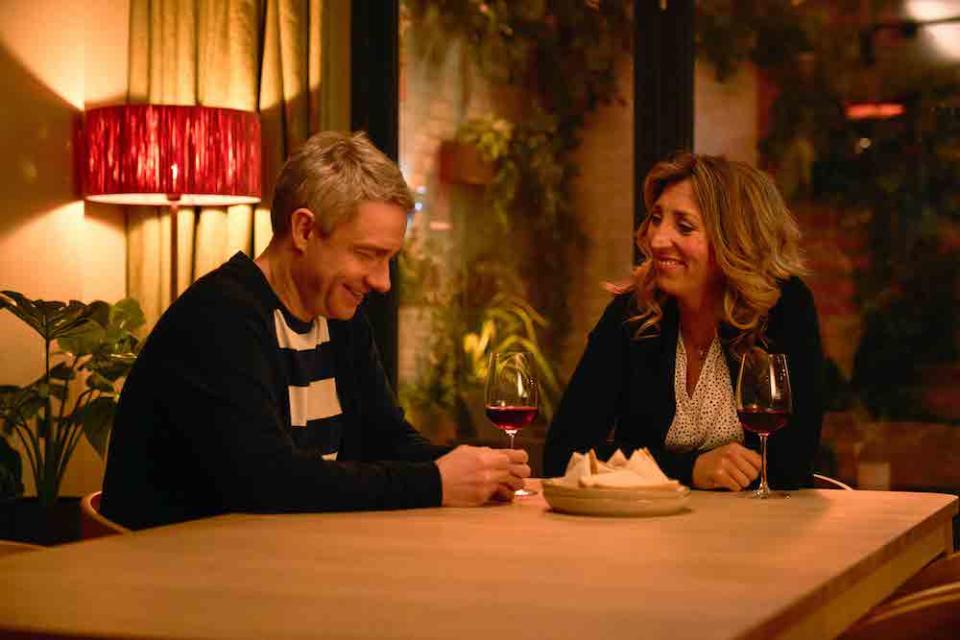‘Breeders’ Treats Time in a Way That’s Profound for Parenting — and TV

[Editor’s Note: The following review contains spoilers for “Breeders” Season 4, Episode 10, “No Matter What: Part Two,” the series finale.]
Typically, when a parent is caught screaming at their child, it’s not the errant adult who needs comforting. But “Breeders” — the FX series about childcare’s unexpected, even unbearable burdens — knows that good moms and dads can have bad moments. Martin Freeman, Chris Addison, and Simon Blackwell’s dark comedy offers itself, time and again, as a shoulder to cry on for caregivers who’ve given so much, they’re no longer themselves. It does so again during Episode 10, “No Matter What,” wrapping its figurative arms around the infuriated father. Well, fathers.
More from IndieWire
'True Detective' Season 4 Trailer: Jodie Foster Unearths Murder Beneath the Ice
'The Curse' Teaser: Nathan Fielder and Emma Stone Flip Out Flipping Houses With Benny Safdie
In the series finale, Luke (Oscar Kennedy) is at his wit’s end. He’s been traveling back and forth between Manchester and London, the former for a coveted music production course at the Manchester Institute and the latter to see his girlfriend, Maya (Deepica Stephen), and their newborn son, Jay. He can’t afford to buy a car (let alone airline tickets), so he makes the six-hour commute by bus as often as two or three times per week. Maya encourages him to travel less and focus on his remarkable opportunity, but Luke wants to be there for Jay — really be there; to see him grow and experience fatherhood.
While sweet and honorable in theory, Luke’s good intentions prove little match for reality. At his son’s naming celebration, his waning sleep, mounting anxieties, and fussy toddler overwhelm the young dad. The baby simply won’t stop crying. Luke holds him, rocks him, and pleads with him to no avail. Desperate, frustrated, and beyond rational thought, he shouts, “Just go to fucking SLEEP, Jay!” When he looks up, his own dad is staring back at him. Paul (Martin Freeman) walked outside right when Luke snapped, but even if he wasn’t physically present, Luke would’ve seen his father in that moment anyway. Because Luke used to be scared of his father. Because his father screamed at his kids.
“Breeders” has been building up to this moment for four seasons. The first scene of the pilot sees Paul trying to compose himself before confronting his noisy kids (a 7-year-old Luke and 4-year-old Ava). “Don’t do this, mate,” he says to himself. “You go in there and scream, they cry, you hate yourself. Breathe. Talk to them. Do it better. Be better.” Of course, he can’t. Paul lets loose the dogs of war (verbally, that is), and despite an immediate apology, their parent-child pattern is set: The kids are bad, Dad gets mad, how long can this go on?
By way of an answer, “Breeders” makes a quietly profound choice with equally hefty dividends. The series deploys well-placed time jumps, three in four seasons, to better explore parenthood’s toll on a mother and father, a daughter and son, a marriage and a family. Season 2 flashes forward five years, to when Luke and Ava are 13 and 10 years old, respectively. Season 3 sticks with that age range, before leaping ahead again for Season 4 to catch up with an 18-year-old Luke and 16-year-old Ava. Major moments bookend each of these temporal shifts. Paul starts going to therapy at the end of Season 1, and Luke’s developed an anxiety disorder by the time we’re in Season 2. Growing fear causes Luke to punch his dad at season’s end, which forces Paul to start Season 3 living away from his family. Then, as Season 3 ends and Season 4 begins, it’s Paul and Ally’s marriage that hangs in the balance.
Telling a story that touches on key moments across an entire adolescence isn’t unheard of — “Parenthood,” for example, covers a lot of ground through its massive ensemble, featuring storylines for its many children of different ages, as well as their respective, reeling parents and grandparents. What’s novel about “Breeders” is how it takes advantage of its medium. TV utilizes time in a way that other outlets can’t. Sure, a movie can cover decades of a human life, but one TV show can actually live with you for a decade. You spend hour after hour, week after week, year after year with these characters, and you build a personal, in-depth relationship over time. (It’s one reason so many people feel like the friends from “Friends” are like real-life friends.)

The folks behind “Breeders” are clever enough to recognize they can work that relationship between audience and character to their advantage; they can skip ahead without losing any of the intimacy. They can emulate how it feels to be a parent through the very format of their series.
In “Breeders” like in life, change is both painfully slow and agonizingly fast. For seasons on end, Paul and Luke wrestle with the same recurring issues, and they can be difficult to watch, especially when Paul’s temper gets the better of him. Still, seeing it resurface over years of time — both in the story’s timeline and in actual time spent watching the show — only emphasizes the gravity of the challenge. Change isn’t easy, so it shouldn’t happen overnight.
And yet, so much can change in an instant, particularly for a parent. In the blink of an eye, Luke and Ava are a foot taller and five years older. Parents of grown children say that kind of thing all the time — “the years fly by,” or “they’ll be married before you know it” — but “Breeders” finds a way to embody it, to recreate it, to impart the feeling to anyone watching without a trace of banality. Serialized television allows for each episode to honor the nuances of the Worsleys’ daily realities, just as each season can connect those individual moments to their broader, lasting lives. It’s why, in the end, the series can feel more like the 10 years it’s meant to portray than the 20 hours you’ve literally spent watching.
“Breeders” uses television to convey a cumulative effect with raw, natural power. Perhaps that’s why I shed a few tears fell when Paul caught Luke yelling at Jay. It wasn’t that the scene was overly sentimental or even all that unexpected. Directed by Ollie Parsons, “No Matter What: Part Two” begins with father and son (or grandfather and father) hugging one another, but we don’t know why until much later. When their moment comes, Parsons doesn’t linger. There’s barely a beat of Paul’s reaction before he’s hugging his weeping boy. Then they’re talking, finding a way forward: “I really do know that you feel like you’re in the middle of the spin dryer with everything in the world,” Paul says, “but I’m telling you mate, a couple of nights rest, it’ll do you wonders. Trust me.”
And Luke does trust him. He knows he can, because his father only wants what’s best for him, and he knows he should, because his father needed the rest himself, years prior, when Luke was just a toddler. Time collapses in those final moments between father and son, as “Breeders” closes the loop. It didn’t take long. Only an instant passed between my dry-eyed observation and reaching for the tissues. But it also took years.
“Breeders” Seasons 1-4 are available on Hulu.
Best of IndieWire
Sign up for Indiewire's Newsletter. For the latest news, follow us on Facebook, Twitter, and Instagram.

